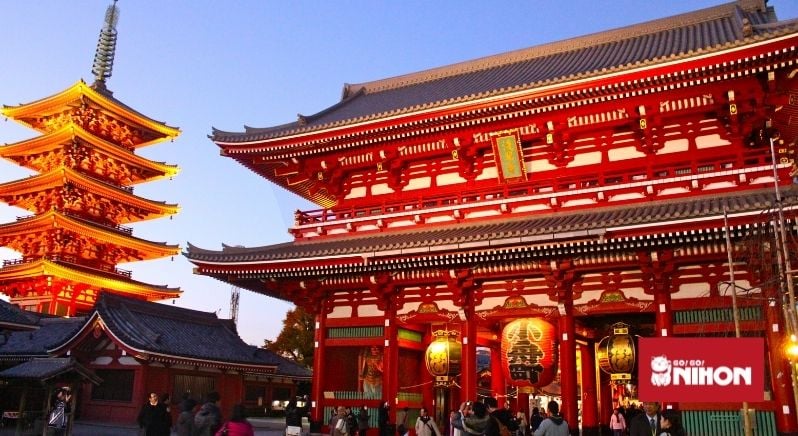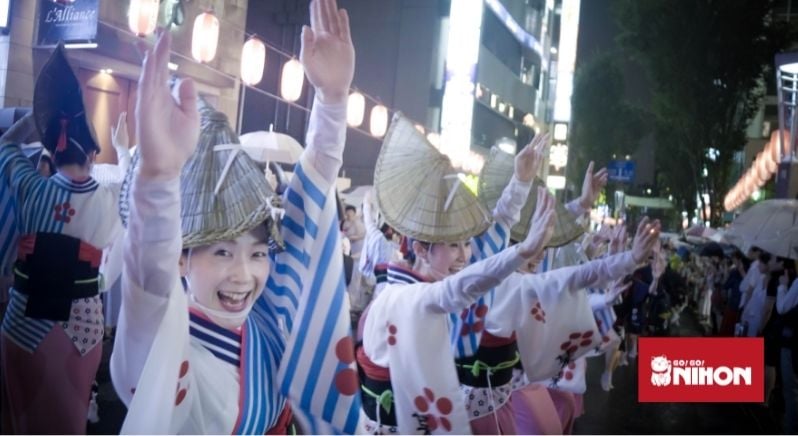Why should the living get to have all the fun anyway? Every 7th month of the year, Japan celebrates Obon お盆, one of the biggest holiday periods of the year. But what is Obon? In short, it is a wholesome family event mixed with a splash of the supernatural. It’s a holiday for remembrance and celebrating life with the people you love.
The best part? The ghosts of our ancestors long passed get to join the party too. Read on to learn more about what the holiday is and how it is celebrated.
What is Obon?
What is Obon exactly? Obon is a traditional Japanese holiday dedicated to family and loved ones past. It is like a mix between Halloween and North American Thanksgiving.
Families who celebrate Obon usually gather in their hometowns, visit gravestones, perform rituals, and attend festivals. But, not every family follows the same customs.
It’s celebrated from August 13th to 15th in most of Japan. But some regions celebrate in July instead, depending on which calendar they follow.

History of Obon
The true origins of Obon are not entirely clear. But, it has over a 500-year history steeped in Buddhist traditions.
Legend has it that long ago a disciple of Buddha had a vision of his dead mother. She was trapped in the Realm of Hungry Ghosts (read: not a fun place to be). So, by making offerings of food and drink the disciple freed his mother’s spirit from suffering.
This story has slowly evolved over time and the meaning of Obon shifted along with it.
Today, Obon is treated as a family holiday to celebrate our loved ones here and gone, wear kimono and yukata, enjoy traditional festivals, and even eat Japanese street food.
How to celebrate Obon & Obon festivals
A mystical set of rituals guides Obon festivals and events. First, check out the ritual details and then learn where you can take part yourself.
Obon Rituals
- Preparations. Before Obon begins, some families prepare two ornaments for their ancestors’ arrival called Shouryou Uma (精霊馬). They’re an eggplant (representing a cow) and a cucumber (representing a horse) with chopsticks stuck inside. Families hope their ancestors will quickly return home on the horse and go back to the spirit world slowly on the cow.
- Welcoming ancestors. On the first day of Obon, revelers light a small fire called an ogara (麻幹). The ghosts of lost family members follow the smoke created by this fire to return to the land of the living.
- Visiting graves. Most families will make some time to visit graves to pay their respects. Cleaning the stones, bringing a family member’s favorite snack or sake, and offering water or flowers are all common practices here.
- Saying farewell. On the final day of Obon, it’s time to let go and say goodbye. Families guide the spirits back to the grave with traditional chochin lanterns (提灯). You may also see floating lanterns in a ritual called toro nagashi (灯籠流し). Both are often a bittersweet, moving, and nostalgic scene.

Obon Festivals
- Bon Odori – Obon Dance Festivals. Bon Odori (盆踊り) is a must-see celebration welcoming the spirits of ancestors. You’ll find throngs of revelers and dancers in traditional garb in the streets moving to the beat of taiko drums. The dances vary by region and make for a lively evening of entertainment.
The most popular of these is Gujo Odori (郡上おどり) in Gifu prefecture. The festival is centered around a small group of performers. They sit on a raised platform in the middle of the town.
You’ll get to witness 10 traditional Odori dances as the party shifts throughout the town from 8 pm until daybreak. It’s a truly exciting spectacle.
Do keep in mind you’ll be among the nearly 30,000 other people in attendance. It may be crowded, but at least you’ll have plenty of chances to speak more Japanese.
- Okuribi (送り火) Festivals. Okurubi are small fires set to guide the spirits back to the other side. But some regions light massive bonfires along the sea or in the mountains.
Check out Kyoto’s Gozan no Okuribi (五山の送り火) for a mountaintop burn. Or see Funakko Nagashi (舟っこ流し) in Iwate. There, the names of the dead are written on paper taped to a boat that’s set ablaze in the water.
Learn about Japan with Go Go Nihon
We hope you now have an answer to the question, what is Obon? Read more traditional holidays like Obon, Japanese culture, and society on our blog, and follow us on Instagram, TikTok, and Facebook.













